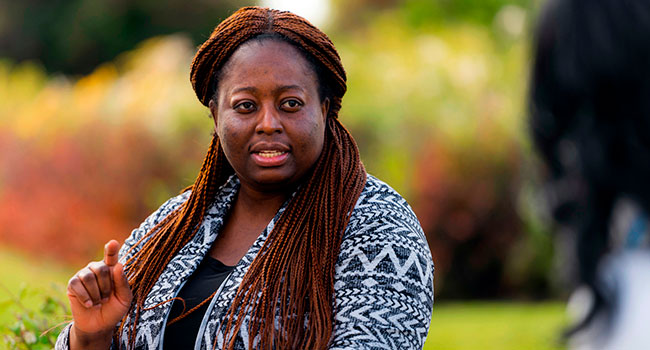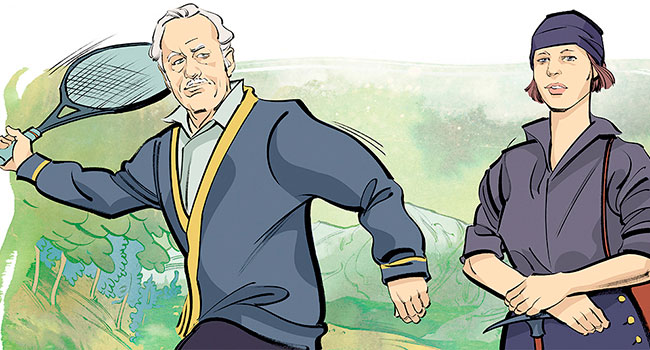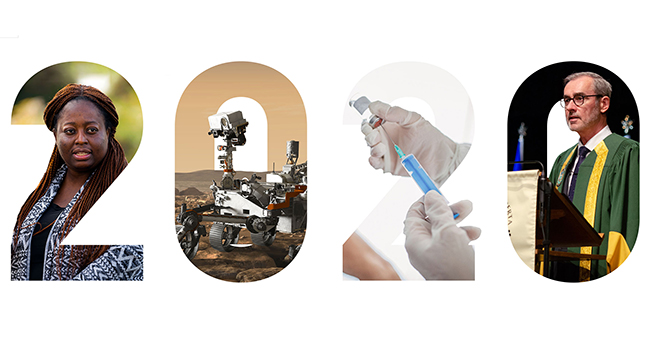Let’s be honest: 2020 has been a tough year.
Amid a global pandemic whose rising tide continues to take an enormous human and economic toll every day, it’s been hard to hold out hope for whatever the “new normal” might look like once COVID-19 finally ebbs for good.
But through everything – including academic and administrative restructuring of unprecedented size and scope – the people of the University of Alberta showed remarkable resilience.
Researchers opened doors of discovery, advanced innovative ideas and revealed insights with far-reaching implications. Professors rapidly adapted to teaching online to deliver the best educational experiences they could. Staff co-ordinated an effective institution-wide public health response and kept the lines of communication open even as they shifted to working remotely.
Students showed deep determination, overcame adversity and unlocked their incredible potential.
And a community united in shock and grief came together to remember and honour those we suddenly lost.
Here are just 20 of the many moments that defined the University of Alberta this year.
1. Virologist Michael Houghton won the Nobel Prize in Physiology or Medicine
Just last week, the U of A virologist and co-discoverer of the hepatitis C virus accepted the medal signifying one of history’s foremost achievements in medical science. For Houghton, the true measures of his success are the millions of lives his work has saved and the teamwork he has fostered among his colleagues and trainees. For the U of A, it was a momentous occasion nearly a century in the making.

2. Researchers pivoted quickly to take on COVID-19
The story of how U of A experts have responded to an urgent need is really dozens of stories.
It’s John Lewis’s promising work on a vaccine. It’s Matthias Götte’s studies showing not one but two ways remdesivir works against coronaviruses. It’s Joanne Lemieux’s finding that a drug that kills a coronavirus in cats might also work against SARS-CoV-2 in humans. It’s Carole Estabrooks’s work on how to fix Canada’s ailing long-term care system. It’s Brian Fleck’s research into whether the coronavirus can spread through ventilation systems, Laurier Fagnan’s research on whether singing spreads the virus, and Stephanie Montesanti’s research on supporting people experiencing domestic violence during the pandemic.
The list goes on, and the number of research projects continues to grow.
3. A community gathered to honour and remember victims of Flight PS752
At an unforgettable memorial service on Jan. 12, friends and family members shared stories of grief and gratitude for the loved ones they lost, including two professors, five graduate students, one undergraduate and two recent graduates of the U of A.
4. Diabetes research took a big step forward
It may be too soon to throw around a word like “cure,” but pioneering diabetes researcher James Shapiro’s latest research – reprogramming blood cells into insulin-producing cells in mice – could eventually lead to a new breakthrough in treating people with Type 1 diabetes.
5. A myth-busting expert battled the ‘infodemic’
Health law and policy expert Timothy Caulfield is well known for his unceasing efforts to counter health misinformation and pseudoscientific claims for purported miracle cures. This year he received new funding for a project to assess how false cures and conspiracy theories spread online, and recommend ways to contain potentially harmful bunk – helping people think before they click.
6. Black scholars spoke out against systemic racism
As massive protests against racial injustice happened around the world, Black scholars at the U of A issued a call for more education and training to help move from mere rhetoric to action against systemic racism in public institutions.

7. Indigenous Canada got a boost from a famous student
The U of A’s online course teaching history from Indigenous perspectives was already one of the most popular offerings in Canada. Then Schitt’s Creekstar Dan Levy signed up and enrolments went through the roof, opening the eyes and minds of tens of thousands of new learners to a history they’d never heard before.
8. An infectious disease expert bridged the COVID-19 knowledge gap
As a near-daily presence in the media since the pandemic began, Lynora Saxinger has been answering questions, countering misinformation and living her belief that sharing academic expertise is integral to helping the public understand the latest available evidence.
9. U of A expertise in diamonds shone brightly
On the heels of a promising discovery in Nunavut, Graham Pearson, Canada Excellence Research Chair Laureate in Arctic Resources, explained how world-leading researchers and top employers are teaming up to train the next generation of diamond explorers and grow Canada’s $2.5-billion-a-year industry.
10. The U of A welcomed new leadership
Bill Flanagan, former dean of law at Queen’s University, began his five-year term as the U of A’s 14th president and vice-chancellor on July 1 and was officially installed on Sept. 16. Flanagan noted in his installation address that he is taking on the role at a pivotal time with unprecedented challenges, “but challenge is no stranger to the university and no stranger to the province.” The news of Flanagan’s selection followed the election earlier in March of Peggy Garritty as the U of A’s 22nd chancellor.
11. The U of A’s newest graduates showed their character
In what may be the most unusual year ever to be a U of A grad, virtual convocation ceremonies in June and November helped the class of 2020 feel the pride and sense of community that mark a major transition in their lives. And in a year when we could all use some inspiration, we found it in the stories of exceptional grads like Billy-Ray Belcourt, who capped off his stellar academic and literary success by earning his PhD, and Martha Ruiz, who sought help after nearly failing out of her program and went on to earn her radiology degree and a hospital fellowship.
12. The U of A consolidated its signature strength in AI research
Over more than four decades, the U of A has become a world leader in artificial intelligence and machine learning. With the launch of AI4Society on Sept. 25, the university acknowledged this signature area of interdisciplinary excellence and confirmed its commitment to advancing teaching, research, scholarship and partnerships to drive technology that promises to change the world in countless ways.
13. A 35-year study revealed insights into how we change as we age
Did you know people tend to get happier as they reach middle age? The idea that the mid-life crisis may be a myth is just one surprising finding from the Edmonton Transitions Study, which has tracked hundreds of participants since 1985, shedding light on life’s transitions and generational differences along the way.
14. A new texting service helped people maintain their mental health during COVID-19
When the extent of the pandemic’s impact became clear in mid-March, clinical psychiatry professor Vincent Agyapong approached Alberta Health Services to see whether a texting service he developed to serve up daily positive messages might be of use. Text4Hope was launched within a week.
15. New Trail hit the century mark
To celebrate the 100th anniversary of the U of A’s award-winning alumni magazine, the editors delved into the archives and found a century’s worth of fascinating and fun gems to share in print and online, from “Six grads we wish we’d met” and prescient predictions to a glimpse of campus life in wartime, and many more.

16. Experts weighed in with news you can use
As the pandemic forced us to change so much of our day-to-day lives, U of A experts offered helpful tips and advice on topics like coping with headline stress, wearing a mask, disinfecting your home, managing finances, helping kids stay active and keep learning at home, keeping kids connected to sports, creating a healthy home office, managing chronic conditions and helping seniors feel less isolated, among others.
When Peter Sankoff began his project to raise $120,000 to provide internships for students across Canada whose opportunities were curtailed by the pandemic, he had no idea he’d suffer a brain hemorrhage midway through. But within days, he was promoting the project on Twitter from his hospital bed, and his incredible perseverance paid off: “I can actually say, without hyperbole, that it almost killed me, but I’m as proud of making it to 100 as anything I’ve ever accomplished in my life.”
18. Researchers earned their salt in the battle against COVID-19
Whether it was engineering researchers developing a salt-coated protective mask that can kill viruses and bacteria, or Edmonton-based startup Outbreaker Solutions teaming up with U of A researchers to create door handles and handrails made of compressed salt to help prevent viruses from spreading, sometimes an innovative idea can come from something most of us take for granted.
19. U of A expertise was tapped for a mission to Mars
The coolest thing about Chris Herd’s role on NASA’s 2020 Perseverance rover mission wasn’t that he was a key player in the first mission aimed at bringing samples from the red planet back to Earth. It was the enthusiasm and clarity he brought every time he talked about the mission in the widespread media coverage it generated.
20. Congress 2021 will go virtual and is set to make history
Set to begin at the end of next May, the 90th annual iteration of this massive event, bringing together thousands of scholars in the social sciences and humanities, offers the U of A a historic opportunity to stage Canada’s largest ever virtual academic conference. Now that’s something to look forward to.
| By Sean Townsend
The views, opinions and positions expressed by columnists and contributors are the author’s alone. They do not inherently or expressly reflect the views, opinions and/or positions of our publication.
